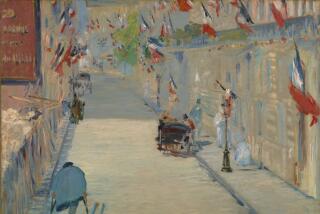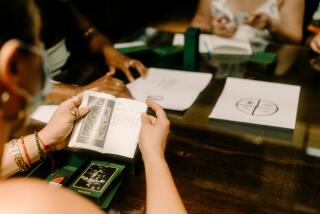Jean Baudrillard, 77; kept a sharp eye on blurry reality
- Share via
The death Tuesday in Paris of French theoretician Jean Baudrillard prompted some unusual Internet postings, including “Baudrillard’s Death Did Not Happen,” “Jean Baudrillard did not take place,” “Baudrillard did not exist” and “Jean Baudrillard is survived by his simulacrum.”
These were, oddly enough, tributes, offered in the spirit of a guru of postmodern thought who exerted enormous influence on contemporary artists and writers, including the creators of “The Matrix” movies. The postings were plays on the claim Baudrillard, 77, had made about the Gulf War of 1991 -- namely, that it “did not take place.”
That war was, in his view, largely a television event, experienced by the masses more like a video game than an actual situation of violence and death. His assertion, infuriating to many, illustrated his big idea: that we no longer can distinguish between imitation and reality -- and that we sometimes prefer the imitations because they seem more real than life.
This state of what Baudrillard called “hyperreality” explains why we are swamped by TV “reality shows,” which are anything but. And it accounts for the perennial allure of Disneyland, which he said is “presented as imaginary in order to make us believe that the rest is real.”
Disneyland is what Baudrillard called a “simulacrum,” a copy more perfect than the original, such as the replicants who cause havoc in the sci-fi film classic “Blade Runner” or the alternate universes depicted in the blockbuster “Matrix” movies. Asked once to describe himself, he said, “What I am, I don’t know. I am the simulacrum of myself.”
He makes somewhat of a cameo in the first “Matrix” film, when the character played by Keanu Reeves opens a copy of Baudrillard’s seminal work, “Simulacra and Simulation,” to reveal a hollow, which he uses to hide a stash of pirated computer disks. Moviegoers hip to Baudrillard loved the joke -- phony disks in a phony book about modern society’s inability to tell the phony from the real -- but the theorist said the movie misinterpreted his ideas.
The movie nonetheless “transformed him,” Larissa MacFarquhar wrote in a 2005 New Yorker story, “from a cult figure into an extremely famous cult figure.” Its false representation of a theory about false representation made the irony dizzyingly complete.
A small, round man who was authentically French in his love of cigarettes and drinking wine at midday, Baudrillard was accustomed to having his theories mangled. His ideas, like those of fellow French intellectual Jacques Derrida, could be maddeningly dense.
He once wrote, for example, that reality “no longer has the time to take on the appearance of reality. It no longer even surpasses fiction: It captures every dream even before it takes on the appearance of a dream.” At the same time, he was the witty aphorist who said, “We are not ... in danger of lacking meaning; quite the contrary, we are gorged with meaning and it is killing us.”
He was also a caustic polemicist. In an essay titled “The Spirit of Terrorism,” published in Le Monde two months after 9/11, he wrote that the World Trade Center attacks were the consequence of a “terrorist imagination” bred by an “insufferable superpower,” the U.S. “In the end,” he concluded, “it was they who did it, but we who wished it.”
Critics condemned him for seemingly justifying the destruction, to which he replied, “One should not confuse the messenger with his message.”
As a messenger, he was often deliberately mysterious. He refused requests to illuminate his past, often replying to questions about his personal history with a terse “No background.” He had a past, but he had worked hard to separate himself from it.
Born in 1929 in Reims, France, and descended from peasants and minor civil servants, he became the first in his family to attend university. He worked as a high school teacher and translator of German literature for several years before studying for a doctorate in sociology at the University of Paris, Nanterre, a hotbed of radicalism in the 1960s. His earliest books, “The System of Objects” (1968) and “The Consumer Society” (1970), reflected his fascination with the signs and symbols of a commodity-driven world.
His ideas began to spread to America in the late 1970s, when he spoke before a packed crowd at a conference hosted by New York’s Whitney Museum of American Art. Gradually he became more prominent in America than in France, where he had been ostracized for his criticism of French historian and philosopher Michel Foucault.
“When he came to the States, he was depressed. I think America saved him in some way,” said Sylvere Lotringer, a professor of French at Columbia University who frequently collaborated with Baudrillard and published his works.
Yet Baudrillard wrote disparagingly of American culture. After driving across the country, he called it “the only remaining primitive society” in his 1988 book “America,” written in the tradition of Alexis de Tocqueville.
Mark Poster, a UC Irvine history professor who was Baudrillard’s editor and friend, said that although “America” was a “nasty” book, the French thinker “liked Southern California quite a bit.” He lectured at UCLA, UC Irvine and UC San Diego.
He made a notable appearance at an avant-garde festival in Primm, Nev., in 1996, where he donned a flashy sequined jacket to read a poem about suicide before a reverential audience of writers, musicians and other performers.
Artists who have cited his influence on their own work include Jeff Koons, Haim Steinbach, Robert Longo and Peter Nagy. His influence extended in part from his willingness to venture into mass culture.
“Among his generation of major French intellectuals, he is the only one who looked at popular culture, television, consumerism,” Poster said. “Many of the others didn’t like him because of this. They tended to stick to high art, high philosophy and theory. He got right down there.”
Baudrillard echoed this view. “While others spend their time in libraries,” he wrote in “America,” “I spend mine in the deserts and on the roads. Where they draw their material from the history of ideas, I draw mine from what is happening now, from the life of the streets.”
His critics were vehement in their dislike of him. Among the harshest were Alan Sokal and Jean Bricmont, who wrote in their 1998 book “Fashionable Nonsense: Postmodern Intellectuals’ Abuse of Science” that if Baudrillard’s texts seem unintelligible “it is for the excellent reason that they mean precisely nothing.”
Such withering attacks did not ruffle the easygoing, if confounding, philosopher, whose death came after a long wrestle with cancer.
“Ouf, it’s a game. A fabulous game. A game,” he told an interviewer some years ago, “that may not really be taking place.”
More to Read
The biggest entertainment stories
Get our big stories about Hollywood, film, television, music, arts, culture and more right in your inbox as soon as they publish.
You may occasionally receive promotional content from the Los Angeles Times.











